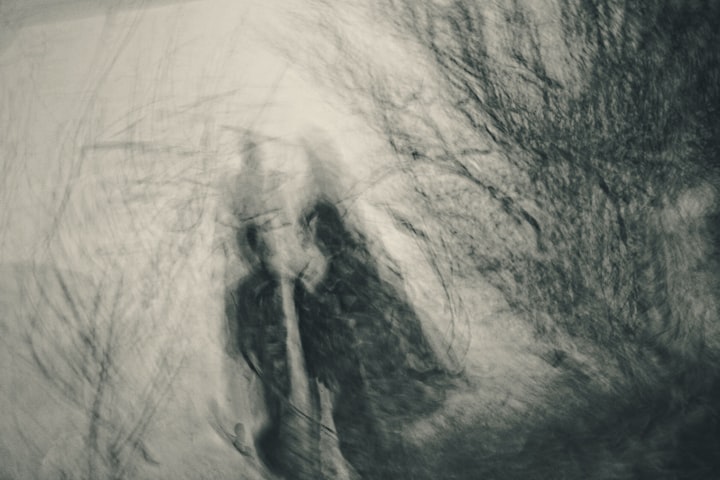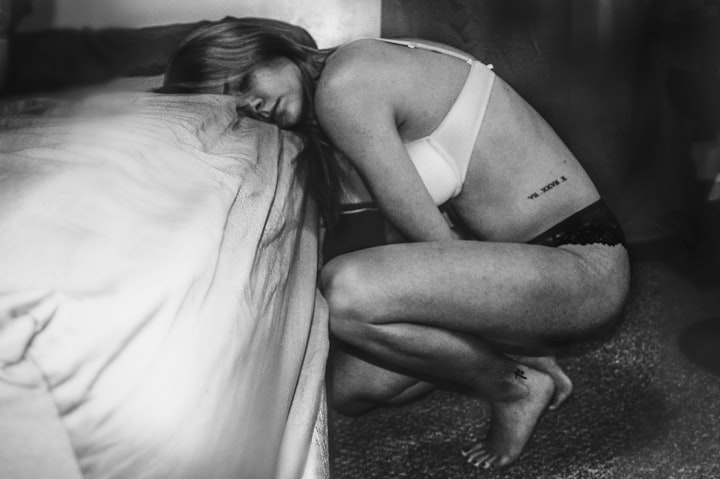Everything Has Gone Pear-Shaped
How a sketch turned the world upside-down
From the first moment, I knew he was trouble. People say that -- like the universe waves a giant red flag over the heads of those who would cause you harm.
I wish it did. It’s never that simple.
I was twenty and working on a degree I wasn’t excited about; when someone else is paying your tuition, you end up handing over the reins to your choices. My uncle had raised my brother and I by himself after my parents died. I would argue he hadn’t done a great job of it, but I still felt like I owed him something. Maybe I always would; maybe that was his intention.
But despite this effort to prove myself to a parental figure who truly thought choosing my major was an act of guiding me in the right direction, I never managed to keep myself out of the art department. I’d wander through between classes, watching the students sprawled on every surface, with their blue hair and piercings and permanently ink-stained hands. There were easels and sketch pads and pastels, and an almost holy sense of quiet. There was a multi-level brick foyer, a graffitied concrete patio, a small grove of trees, benches surrounded by brightly-colored flowers. I’d walk the halls to see the newest work, peek into empty classrooms to glimpse the art left behind. I loved the smell of it, the feeling that perfection wasn’t the goal, just creation. Making something, where before there had been nothing. I haunted those halls like a ghost; sometimes I felt like one.
One day, out of nowhere, someone saw me. All at once my life was interesting to someone: this guy who hardly ever put down his sketchbook decided he’d look over it at me.
Getting involved with him meant I had an excuse to hang around the art students; I’d leave my final class, dodging the chatter and small talk from my classmates, and place myself among these quiet, serious people. I could talk to him; I could study here. It was at once an escape and an adventure, a safe place and a risk.

Over time, more of my day was spent with him than anything else. Class, then him. Back to the dorm to sleep, then to the art building to see him before class. Class, him, dorms, him, class. My life became a push-pull exercise of being where I was supposed to be and being where I wanted to be. We sat outside some days, under the branches of a pear tree, and got to know each other. I’d bring him lunch and he’d try sketching my face. He gave me one of his sketches: me, biting into a pear, sunshine and shadows across my face, raising an eyebrow at him. I hung it on the wall of my dorm, next to my bed. He really saw me; told me he found me fascinating. No one had ever said that to me before. He commented often on my major and how it didn’t seem to inspire me. I didn’t want to explain, so I’d tell him that I was just trying to be responsible, trying to choose something I’d have a stable job in after graduation. He called me a liar; he was right.
It was clear to both of us, from the beginning, that we were lying. I don’t know how it started, maybe just the chemicals of our personalities creating something toxic in the bond, but neither of us shared ourselves the way normal people would. That sketch of me under the pear tree was the closest he ever came to showing affection for me at all. Lying to each other became an odd unspoken contract, a promise that neither of us were emotionally involved.
We’d go for drives into the woods nearby, have sex in the backseat of the car, have a few drinks, go for a hike. These moments alone were rare at first, and then they were the majority of my day. We stopped spending so much time in the art department, or under the pear tree, and more time in my car, or in the woods. It was like he was trying to run away from something but couldn’t get very far. Some days he was angry; the sex was rougher, more intense, like he was trying to grab hold of something so he didn’t float away from the earth. He would take fistfuls of my hair, or grip my wrists, or sink his teeth into my neck. I’d ask him what was upsetting him and he’d dodge the question; after awhile, I stopped asking.
He seemed strange one particular day as I was leaving for class; dark, somehow. Too still. He sat in his usual chair by the window, and the shadows fell on his face in a way that unnerved me. I didn’t ask him what was wrong, because I never did anymore. I asked if he wanted me to stay with him and he nodded, still sketching.
I sat back down. I missed my classes. We didn’t speak, but I had the distinct feeling that if I had left him alone, I would have come back to an empty armchair and a lifetime of regret. We spent the day in thick, heavy silence; eventually he stood up and we drove out to the woods.
That night was an angry night; I went back to the dorms worried about him, cleaned the scratches he’d left as best I could in the shower. The bruises didn’t bloom until the next morning.
In class the next week, a professor glanced pointedly down at the bruise around my wrist and asked if I was okay; I wondered if she could see the outlines of his fingers. I told her I was fine and started wearing long sleeves.

I didn’t know how else to keep him safe. I felt like I was the only lifeline he had; that grasping at me and my presence and my not-quite-love was all that was stopping him from going somewhere I couldn’t follow. This man who’d seen me, a ghost in an art department hallway, was suffering and I was the only one trying to help.
Not long after that, I stopped going to classes entirely.
We stopped sitting under that pear tree; he stopped sketching me. We’d sit in shadowed corners and he’d sketch feathers and ropes and brick walls covered in ink. Without class to anchor me, I started drinking when he did. It was like I was proving my level of trust in him. Ten in the morning, sometimes, and he’d hand me a plastic bottle. I’d drink it without knowing or asking what was in it. I could see it pleased him, having someone who trusted him that way. Knowing I would drink it if he asked me to. By then, I was doing a lot of things just because he asked.
There was a day when I could tell he needed an escape; his expression was like thunderclouds and it wouldn’t have surprised me if he’d punched a wall. I didn’t think he should be near people; I wasn’t sure what he’d do to them. I told him we should go for a drive and he came with me. At some point he started giving me directions and I followed them; anything to calm that terrifying look on his face. We drove out to a house in what could only be called a rural area; the next house wasn’t for miles. He had a key and I didn’t ask why, or how. Did he own this house? Was it a friend’s? Did he have friends? It occurred to me at this moment that I’d never asked.
I’d removed him from the presence of other people, and now I was the only one left. It occurred to me that he could kill me here and no one would know where I was. My uncle and brother were blissfully unaware of my life by this point; my friends had drifted as I spent more time in the art department. I didn’t have anyone checking in.
We had sex on the floor by a window, and I wondered briefly if we could be seen from outside; I wondered if I cared anymore. We were both half-drunk and he was in his dark mood, gripping me too tight, pulling my hair too hard, biting down with too much force. I could tell I was bleeding; I worried that my neck might snap. I started crying halfway through and he didn’t notice. I wiped my face on my sleeve before it was over.

In a moment I still don’t remember clearly, he had a knife in his hands and he was cutting a line down my bare back. There’s a sound your skin makes when you cut it; if you listen closely enough, you can hear it tear. I was listening to my own skin coming apart and I didn’t move. I didn’t know what would happen if I did; he’d never been in a mood as dark as this one. When I finally risked asking him what happened, he pretended he hadn’t heard me and told me to roll onto my back. I did as he asked.
He put the knife to my throat.
I don’t know what instinct or reflex -- maybe just fear -- made my hand close over his before I’d even considered moving. And then I said a word I’d never said to him before.
No.
I heard the knife clatter somewhere and then his hands were on my throat; I tried to scream but there was no air, just pressure pressure pressure, and when I saw the look in his eye I knew I was going to die.
People say that -- I thought I was going to die. I didn’t think; I knew. I knew I was going to die right here, naked on the floor of a strange house, with charcoal-dusted hands that had never loved me wrapped around my throat. I thought of my parents and how disappointed they’d be in who I’d become; I wondered how I’d gotten here, to this moment, dying for no good reason. I’d wanted the art, the boy with the sketchpad, the long conversations in the shade of a pear tree, the sketches of my face, the freedom to sprawl silently in a room full of creativity. I’d just wanted to stop being a ghost.
And here I was, dying for it.
The phrase dying for your art came to mind; the edges of my vision started fading. This was my final moment on earth, and I couldn’t think of any last words, anything except please. There was nothing profound about my death; just a stupid girl who’d made stupid choices, a girl who’d let some disturbed boy upend everything she’d worked for.
The room lit up, blue-white blue-white blue-white.
A siren going off; shouting, footsteps, a weight torn away.
Suddenly, miraculously, I wasn’t dying anymore.
I closed my eyes as they loaded me onto a stretcher, and I took deep breaths -- out of spite.
He’ll be in prison for a long time, they told me later. I can’t imagine what I’d say if faced with those thundercloud eyes one more time. I didn’t know how to talk to this angry man whose hands almost ended me, without also picturing the boy with a sketchpad under a pear tree. He’d become someone else, so slowly and gradually that I didn’t notice until someone else knocked down the house of cards around me. They say if you put a frog in water and increase the temperature slowly, it’ll allow itself to be boiled alive because it doesn’t perceive the danger until it’s too late.
He boiled me alive, I thought to myself, and then added -- almost.
I never went back to the art department. I never sat in the shade of that pear tree again.
About the Creator
Shea Keating
Writer, journalist, poet.
Find me online:
Twitter: @Keating_Writes
Facebook: Shea Keating







Comments
There are no comments for this story
Be the first to respond and start the conversation.